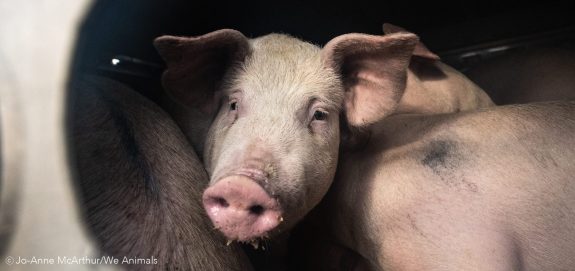On March 10, 2021, the Manitoba government finally pulled back the curtain and revealed the contents of its ag gag (aka “agricultural gag”) bill. Bill 62, the Animal Diseases Amendment Act, would restrict peaceful protests outside of slaughterhouses and conceal animal suffering and neglect in trucks transporting farmed animals to slaughter.
To those watching, the bill was no surprise. The province had been quietly considering ag gag legislation for some time. What was surprising was the undemocratic and secretive way it was introduced. First, the government consulted the public in the fall on potential ag gag legislation, using an ambiguous online survey. Two days after the consultation closed, the government introduced three new bills, the titles of which suggested the province was following the troubling lead of Alberta and Ontario by targeting those who document and publicly expose the suffering of farmed animals, and by restricting rights to peacefully protest on public property outside of slaughterhouses. In fact, the three bills are among 19 new bills that the government introduced last November without actually sharing their content with the public, or even with opposition MLAs who will ultimately be expected to vote on them.
Bill 62 is being condemned by Animal Justice, Humane Society International/Canada, and World Animal Protection, among other groups. It would make it an offence to “interact” with farmed animals in transport. This broad and ambiguous prohibition could capture an array of peaceful protest activities, including looking in trucks transporting animals, taking photographs or videos of the conditions in which animals are transported, speaking to animals, or even making eye contact with them. It would silence concerned citizens who take photographs and videos showing the poor conditions in which animals are transported in order to raise awareness about the mistreatment of farmed animals. This evidence can also be used to submit complaints to law enforcement authorities when regulatory standards are violated.
Canada has some of the worst animal transport rules in the industrialized world. In some cases, animals can be transported for days at a time without food, water, or rest. Millions arrive dead each year, with many freezing during long journeys in frigid temperatures or dying from heat exhaustion on hot summer days. Footage obtained by concerned citizens in Manitoba has shown feather-bare chickens and turkeys transported in freezing temperatures, pigs crowded in trucks, and filthy conditions, among other disturbing images.
Bill 62 would also make it an offence to provide food or water to a farmed animal without the consent of the driver or “owner” of that animal, even when the animal is showing clear signs of distress due to thirst, malnourishment, or heat exhaustion. An individual who gives food or water to a farmed animal could be fined up to $10,000 or imprisoned for up to one year—twice as long as first-time offender convicted of animal abuse under Manitoba’s Animal Care Act.
In addition to being dangerous for farmed animals, Bill 62 may well be unconstitutional. Ag gag laws have been struck down in six US states, with courts finding them to be unconstitutional violations of the right to free speech. When Ontario introduced its American-style ag gag bill, 43 lawyers and academics from across the country warned that the law was likely unconstitutional. Animal Justice is now challenging Ontario’s ag gag law, including its prohibition on “interacting” with farmed animals, in court.
Animals farmed for food already lack legal protections, and their abuse and mistreatment happens behind closed doors. Rather than further shielding the industry from public scrutiny, our governments should be increasing transparency and oversight to protect animals, workers, public health, and the environment. Take action now and tell Manitoba to say no to ag gag laws.
Join the Animal Justice mailing list




